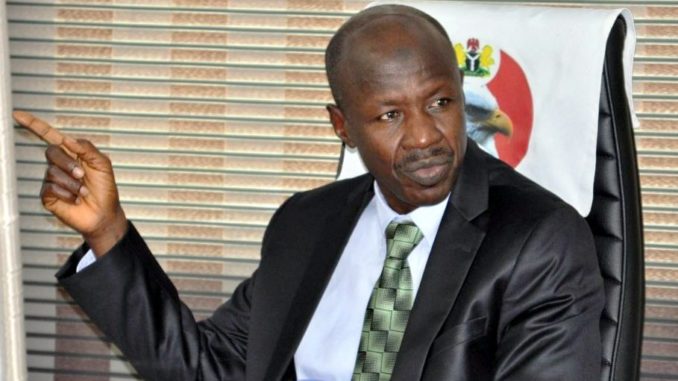
The senate will be floored in court over its insistence that it must confirm certain appointees before they can assume office, a senior presidency official told TheCable at the weekend.
The upper legislative chamber has twice rejected the nomination of Ibrahim Magu as chairman of the Economic and Financial Crimes Commission (EFCC).
However, Magu has been retained as the acting chairman of the commission amid insistence by Acting President Yemi Osinbajo that section 171 of the 1999 constitution does not mandate the senate to confirm appointments into extra-ministerial bodies, such as the EFCC.
The EFCC act mandates the senate to confirm the nomination of Magu, who has been acting since November 2015.
This has led to a face-off with the senate, which recently resolved to suspend the consideration of all the nominees of the executive.
However, TheCable understands that presidency has received legal advice that it would floor the senate in court over the issue.
“In fact, Walter Onnoghen, before he became chief justice of the federation, ruled in the case of Chief Isaac Egbuchu V. Continental Merchant Bank Plc & Ors (Supra), at page 19, paragraph C that ‘the time-honoured principle of law is that wherever and whenever the constitution speaks, any provision of an act/statute on the same subject matter must remain silent.’ That is a clear indication that presidency is right to insist that section 171 of the constitution is superior to the EFCC act,” the senior presidency official said.
“Although it is the view of presidency that certain federal appointments should not require the confirmation of the senate based on Section 171 of the Nigerian constitution, the Buhari administration has continued to send such appointments to the senate pending the ultimate judicial interpretation of the matter.
“This is based on a legal advisory prepared by judicial and legal experts as a working document in the presidency regarding the differences in the constitutional interpretations on matters of certain federal appointments.”
An official of the presidency said it is “not accurate” to say presidency has started to act “unilaterally” on its own interpretation of Section 171.
“Even after the acting president, who spoke when he was VP in support of the view of some leading lawyers, the presidency has continued to send nominations to the senate both while the president himself was around and while away by the acting president,” he said.
“Since the time the acting president spoke and when senate recently expressed its disagreement, we have been sending nominations severally including into the INEC and other boards and commissions. So we are clearly not acting unilaterally based on our own interpretation of the law, even though we believe firmly we are right.
“The presidency believes that section 171 is clear that certain appointments do not require senate consent, but the presidency is not already behaving as if its interpretation of the law has become a policy.
“Presidency is persuaded that its interpretation is the correct one, but we are conscious and aware of the fact that only a proper judicial ruling on the matter would make it a settled policy that sits right with the rule of law. That is why we have not stopped sending all manners of nominations to the senate, most of which the senate has actually confirmed, even well after the acting president spoke.
“In fact, the conclusion of the legal advisory on the matter is very clear that a judicial pronouncement preferably by the supreme court is what will settle the matter.”
WHAT DOES EFCC ACT SAY?
2 (3) The Chairman and members of the Commission other than ex-officio members shall be appointed by the President subject to the confirmation of the Senate.
WHAT DOES SECTION 171 OF THE CONSTITUTION SAY?
(1) Power to appoint persons to hold or act in the offices to which this section applies and to remove persons so appointed from any such office shall vest in the President.
(2) The offices to which this section applies are, namely (a) Secretary to the Government of the Federation; (b) Head of the Civil Service of the Federation; (c) Ambassador, High Commissioner or other Principal Representative of Nigeria abroad; (d) Permanent Secretary in any Ministry or Head of any Extra-Ministerial Department of the Government of the Federation howsoever designated; and (e) any office on the personal staff of the President.
(3) An appointment to the office of the Head of the Civil Service of the Federation shall not be made except from among Permanent Secretaries or equivalent rank in the civil service of the Federation or of a State.
(4) An appointment to the office of Ambassador, High Commissioner or other Principal Representative of Nigeria abroad shall not have effect unless the appointment is confirmed by the Senate.
(5) In exercising his powers of appointment under this section, the President shall have regard to the federal character of Nigeria and the need to promote national unity.
(6) Any appointment made pursuant to paragraphs (a) and (e) of subsection (2) of this section shall be at the pleasure of the President and shall cease when the President ceases to hold office;
Provided that where a person has been appointed from a public service of the Federation or a State, he shall be entitled to return to the public service of the Federation or of the State when the President ceases to hold office.
Follow us on twitter @jimidisu
END

Femi Falana (SAN) is d problem (over sabi) as he is now the Judiciary